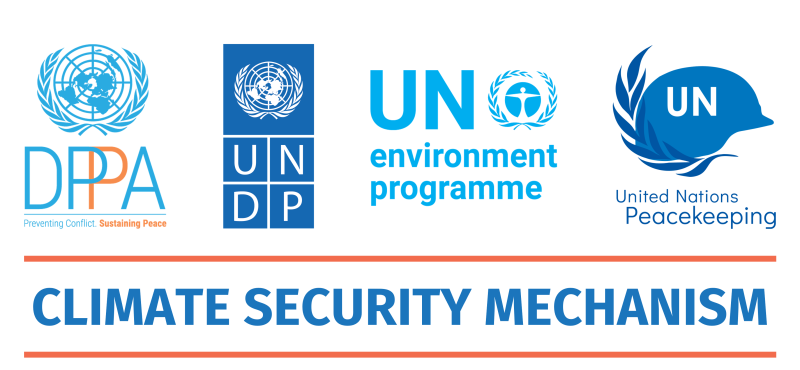Baku, Azerbaijan – 15 November 2024 - Today, at COP29, the Climate Security Mechanismi (CSM) at the United Nations and the Group of Friends on Climate and Securityii convened an official UNFCCC COP29 side event titled “Peace and Security in a Changing Climate: From Analysis to Action”.
Held on COP29 Peace, Relief and Recovery Day, the high-level panel highlighted the linkages between climate change, peace and security, and brought together key voices to explore practical solutions for advancing peace-positive climate action. The event culminated in a pledges and commitments session, where participants announced new pledges of support and partnerships. These included:
- New memberships in the Group of Friends on Climate and Security: Antigua and Barbuda, the Commonwealth of the Bahamas, the Republic of Cabo Verde, the Republic of Latvia, the Republic of Moldova, the Republic of North Macedonia, the Federal Republic of Somalia, and the Democratic Republic of Timor-Leste pledged to join the Group of Friends, established in 2018 by Nauru and Germany. These new members bring the Group’s total to 78 Member States from all regions worldwide.
- New partners and pledges of financial support to the Climate Security Mechanism: Denmark and Slovenia pledged to support the CSM as new donor partners – respectively contributing DKK 5 million and EUR 50,000 - committing to collaborate with the CSM on future initiatives. Slovenia pledged to continue financial support in 2025. Germany and Austria announced new commitments – respectively EUR 1 million and EUR 120,000 – to further support the mission of the CSM. Norway said it would continue its multi-year financial support in 2025 with a commitment of NOK 6 million and encouraged other donors to also invest in multi-year commitments. Denmark and Germany committed to continuing their support of Junior Professional Officers. These vital contributions will enable the CSM to advance its work, including context-specific initiatives that address the linkages between climate change, peace and security and catalyze action, and the deployment and backstopping of Climate, Peace and Security Advisors to UN peace operations and regional organizations.
- Green Climate Fund: The Green Climate Fund recognised the valuable role of the United Nations Climate, Peace and Security advisor network, and particularly the support of the Somalia advisor, which contributed to the first-ever visit of GCF to Somalia in March 2024, and the subsequent investment allocation of USD 100 million for climate initiatives this year.
- Peacebuilding financing: The Secretary-General’s Peacebuilding Fund (PBF) would continue to respond to demand from Member States who seek to peacefully resolve and build resilience to conflict drivers that are exacerbated by climate change. In 2024 alone, the PBF expects to approve over USD 36 million for related programmes in 13 countries. The PBF will build on lessons identified in its 2023 Thematic Review on Climate Security and Peacebuilding, facilitate coherent approaches of the United Nations system with a strong emphasis on gender and youth-inclusive approaches, and seek to increase synergies with partners such as international financial institutions and climate funds to increase catalytic effects.
- Pacific Islands Forum: Nauru announced the imminent deployment of a new Climate, Peace and Security Advisor to the Pacific Islands Forum by the Climate Security Mechanism. The advisor will play an essential role in advancing the Pacific's climate security initiatives, aligning with the 2050 Strategy for the Blue Pacific Continent and the Boe Declaration, including its Action Plan.
- Partnerships: The Organization for Security and Co-operation in Europe (OSCE) reaffirmed its commitment to mainstreaming climate considerations across its organization and pledged to strengthen collaboration with the Climate Security Mechanism and other partners to support joint efforts in addressing climate-related risks to global peace and stability.
- Women, Peace and Security: The United Nations Women’s Peace and Humanitarian Fundpledg ed to further invest in the active participation and leadership of women and girls on peace-positive climate action through its Funding Initiative on Women and Climate Security. With an initial USD 5 million already committed, the Fund will accelerate its resource mobilization efforts to reach its USD 20 million goal. These new investments will extend the geographic reach and scope of this critical initiative to women most affected by the impacts of climate change. The Fund will also explore synergies with the Climate Security Mechanism, particularly through its network of Climate, Peace and Security Advisors.
- Network of climate-vulnerable countries affected by conflicts: Chad, as a member of the Group of Friends on Climate and Security, and representing the newly-established Network to strengthen peace and resilience in climate-vulnerable settings, looked forward to strong partnership with the CSM and the United Nations Regional Office for Central Africa (UNOCA) to advance the Climate, Peace and Security agenda with Member States.
The event brought together distinguished panellists from government, the United Nations, and civil society. Discussions focused on how the climate emergency acts as a risk multiplier, with displacement and migration, food insecurity, water scarcity, and livelihood loss among the primary channels through which climate change undermines peace and stability. Those that have contributed the least to climate change face the greatest risk of being overwhelmed by its impacts. Where climate change intersects with fragility and conflict, its effects are especially severe. Many of the countries most vulnerable to climate risks host a United Nations peacekeeping or special political mission, underscoring the need for integrated approaches to climate resilience and peacebuilding.
Originally published on www.un.org

